Beyond the forbidden city
Highlights from the ICC Banking Commission Annual Meeting in Beijing in May 2019
As the International Chamber of Commerce celebrates its centenary, new trade finance opportunities and ecosystems anchored in China’s economic growth and Belt & Road Initiative are emerging. Clarissa Dann reports on key themes discussed at the recent Banking Commission Annual Meeting in Beijing.
When the world’s largest trading nation opened its doors to more than 700 trade finance industry experts from 59 countries to share best practices and discuss trade facilitation, 3000 years of history met the epicentre of digital transactional technology.
The ICC Banking Commission’s 29th Annual Meeting took place in Beijing from 8 to 11 April 2019 at the China World Summit Wing, with this record turn-out largely down to a Chinese thirst for trade finance networking and thought leadership. Unsurprisingly, many of the sessions were conducted in Mandarin with translation services for those who had not got as far as recognising the characters for the Middle Kingdom (中国).
And for many, myself included, this was a first visit to China and a rather wonderful introduction to an economy and culture that has, as event host Yu Jianlong, Secretary General of ICC China puts it, “witnessed rapid economic and social development since the adoption of the opening up policy”.
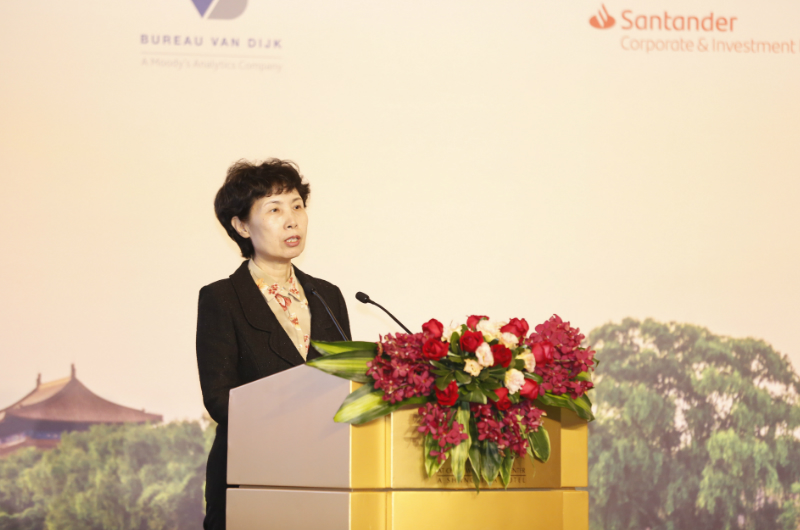
In her welcome remarks, Gao Yan, Chair of the China Council for the Promotion of International Trade (pictured) said that she expected the global financial industry to get access to the Chinese market “to achieve mutual benefit and win-win development of the Chinese domestic and international banking industry.”
The event was held against an economic backdrop of the ongoing conflict between the People’s Republic of China (PRC) and the US (America’s US$200bn of tariffs on Chinese imports had not yet been announced) which analysts had repeatedly said that would affect investment and growth in developing Asia. Asian Development Bank’s annual Development Outlook, published in April 2019) made the point that “with various uncertainties stemming from US fiscal policy and a possible disorderly Brexit, growth in the advanced economies could turn out slower than expected undermining the outlook for the PRC and other economies in the region.”
Unsurprisingly much of the focus of the ensuing sessions was on promotion and facilitation of trade in spite of these headwinds.
Core principles
“This is a true landmark event reflecting the ICC’s position as the world business organisation enabling businesses to secure peace, prosperity and opportunity for all and I personally believe this is more topical than ever,” said ICC Banking Commission Chair Daniel Schmand in his opening speech.
Schmand, who is also Deutsche Bank’s Global Head of Trade Finance, went on to remind delegates of the core principles that prompted the foundation of the International Chamber of Commerce in 1919 in the aftermath of World War 1, when “the world desperately needed to rebuild economies and societies at a time when there was no global system of rules to govern trade, investment, finance or commercial relations”.
Early milestones include creation of the International Court of Arbitration, recognising that international dispute resolution is essential to the growth of international commerce (1923); the precursor to the World Trade Organization in the form of a report to the League of Nations on lowering tariff barriers (1927) and establishing the ICC’s global rules for documentary credits in the 1930s – a time of growing nationalism and protectionism.
Moving onto the Banking Commission specifically and to the world’s current challenges in the trade finance space, he then set out the framework underpinning the talks and panel discussions that took place at the Beijing Annual Meeting:
- Positioning of the Banking Commission and trade finance in a digital ecosystem;
- Promotion of supply chain finance and sustainable trade finance;
- Advancement of dialogue with regulatory authorities to cater for “pragmatic and effective rules”;
- Facilitation of global trade in the context of major trade initiatives such as China’s Belt & Road Initiative; and
- Strengthening Asia’s role within the trade finance industry and building inclusion in the region.
It was the latter two elements that played out during the conference’s proceedings, celebrated in traditional style at the Gala Dinner on the first night with the cutting of ICC’s birthday cake.
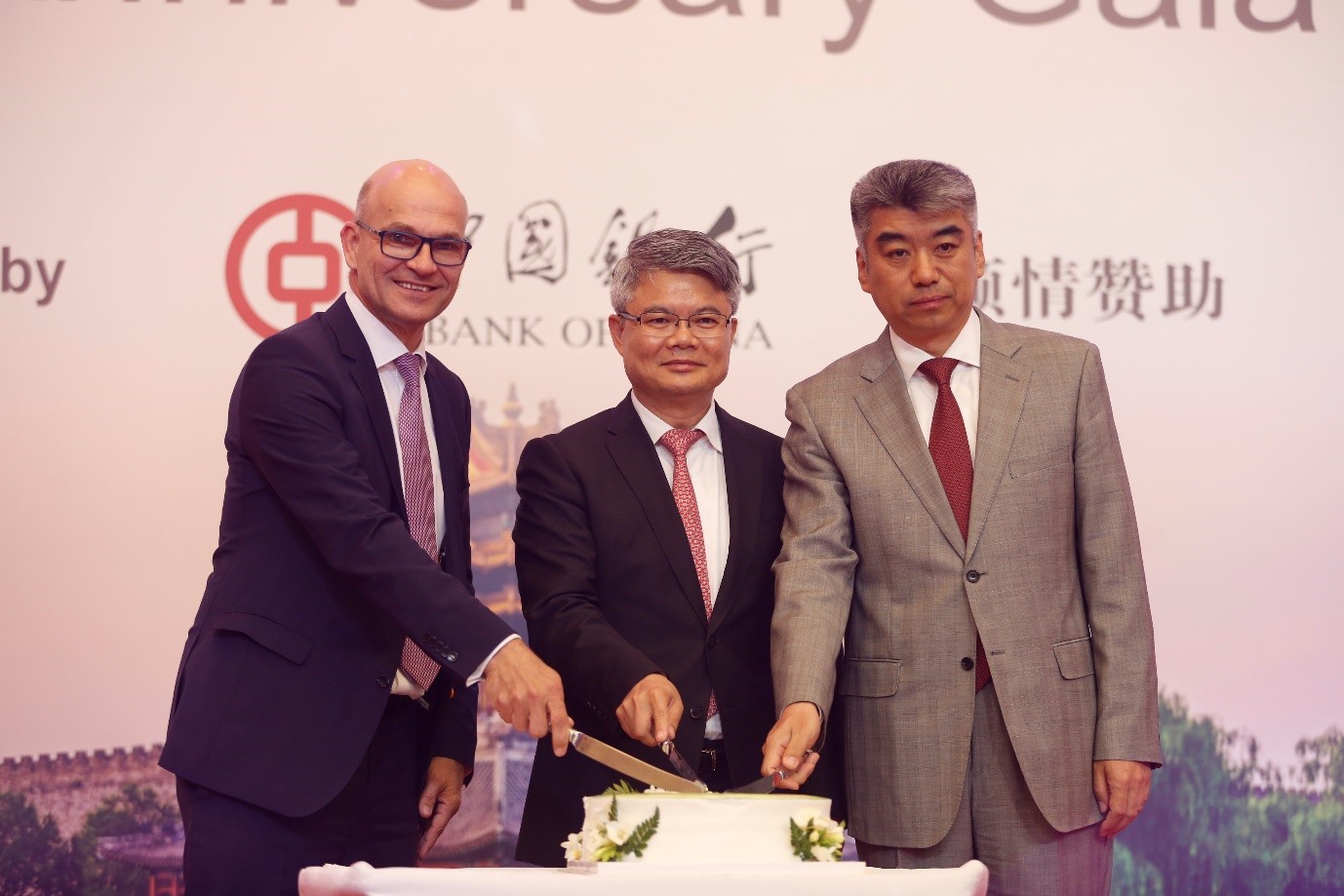
Left to right: ICC Chair Daniel Schmand cuts the centenary birthday cake with hosts Lin Jingzhen (Vice President Bank of China); and Chen Zhou, Vice Chairman of CCPIT & CCOIC
Business leader perspectives
UN agenda
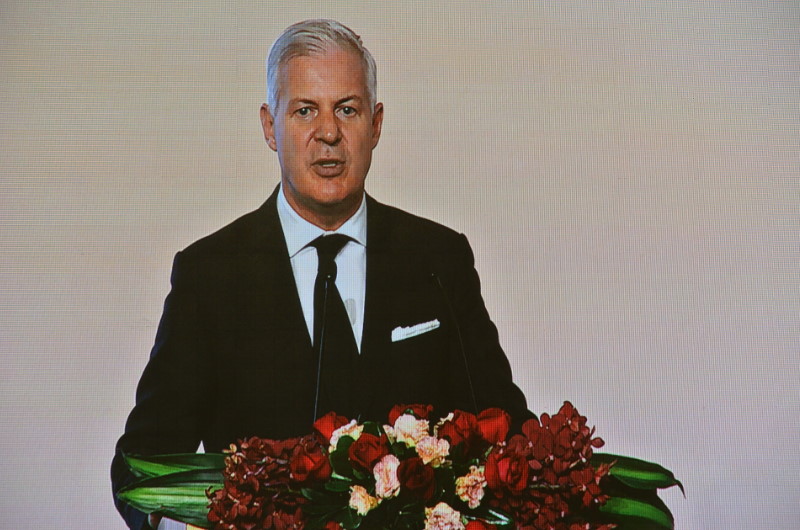
As the first Australian to lead the ICC, Secretary General John W H Denton’s career as an international lawyer had been taking him to Beijing for decades (pictured above). “I have been coming to Beijing since 1985. One of the benefits of having such a broad sweep of engagement with China is that I have seen the scope and speed of change there from 1985 to 2019. When I was first there, I got around by bicycle as there was none of the traffic you see now.”
Those of us who had got stuck in very long traffic jams to go a short distance to and from the conference hotel could relate to this. But, he continued, “Traffic gives me confidence in China’s prospects and the way it has adapted. I am bullish about China and I have made it part of my life’s work to deepen the relationships with China.” One example of this, he said, was the establishment of the Australia-China CEO Roundtable Meetings pulling together leading corporations of Australia and China to develop and better inform bilateral trade relationships.
His talk paid tribute to the “enormous power and authority China brings to global affairs”. “We now see an economy which has lifted millions out of abject poverty and not just in China and has seen its extraordinary support for global development as well.”
The ICC was granted UN Observer Status in December 2016 under the aegis of Denton’s predecessor, John Danilovich, a baton that Denton has grasped with alacrity – the ICC is the only private sector institution in the world with a permanent seat at the UN. The United Nations 2030 Agenda addresses sustainable development and the tackling of growing populist and protectionist forces within the global economy.
“We are involved in actions to preserve this planet and have been heavily involved in taking action on climate change, which is why we were involved so heavily in the Paris Agreement [COP21, December 2015].
Transactional demand
This led neatly into the CEO Question time, moderated by Denton, where senior financiers reflected on their day to day activities and their implications for cross-border trade finance.
Deutsche Bank’s Chief Country Officer of China, Feng Gao, made the point that central banks had flooded the market with liquidity, changing market dynamics to the point that now there is a lot of liquidity chasing trade assets. The challenge, he said, is working how to link to a transparent and universal framework. “I think this is very important, particularly when it comes to tracking evidence of socially responsible lending.” This was picked up in a later session by Daniel Schmand who pointed out that the largest provider of liquidity was asset managers hunger for assets and that the supply chain needed to be an investible asset class.
Feng, together with ANZ’s China CEO Xiaoguang Huang agreed that China was one of the largest trading nations in the world and China’s swing from net capital inflows to large net outflows presented opportunities to support customers in the region.
Deputy CEO of HSBC China Todd Wilcox (an Australian who has lived and worked in China for many years) highlighted the sheer cost of providing trade finance to meet the demand in the region given that around US$750bn goes of China each year in letters of credit and 50% of the attached cost lies in the paper. SWIFT’s Managing Director of Asia Pacific Eddie Haddad agreed there was “a lot of friction in cross-border payments still” and that SWIFT had spent the past two years taking this out with SWIFT gpi. “It helps provide a better service,” he said. “Technology is a disruption, but we welcome the change,” said Feng. “All financial institutions felt the strain after the global financial crisis and technology has the potential to improve efficiency of the systems and transparency.”
The panel agreed that in China, innovation happens all the time, and the demographics will keep the pressure on. “Around 250 million Chinese tourists are set to travel abroad by 2020, the majority of which expect to be able to perform all their key transactions with one touch on their phone,” commented Bank of China’s Deputy Manager of GTB, Liu Yunfei.
On the basis of some recent research she had studied, Liu put the total volume of cross-border e-commerce in 2017 RMB8trn (US$1.163), up 20% on the year before and looking set to increase by the same percentage again for 2018. She added, “It is estimated that by the year 2020 those Chinese buyers who like to purchase globally will account for 25% of the total Chinese population. This is just unimaginable.”
“I use my phone for everything,” said HSBC’s Wilcox. China is the world’s leading issue of letters of credit, said Wilcox, with around US$750bn of them going out of China each year. Reducing the cost of processing paper has become such a priority for HSBC. The banks, he said, is “investing US$2.3bn over two years to keep up on the digital front”.
Denton said the ICC was disturbed by the tensions arising from an overall withdrawal from multilateral trade agreements. “It is our duty”, he continued, “to fight for the multilateral trading systems that brought so many people out of poverty” and he called for relevance, flexibility and accountability to be brought to bear in discussions around multilateral trading systems, so that trade can be made to work for people good. If it makes people unhappy policies emerge, he said, that inhibit trade.
World trade reform is a business issue, explained Denton, “Just as climate change is a business issue – so its modern slavery and stopping the rise of global inequality – we cannot afford to sit on the side-lines.
“We want to be able to look back at the end of our second centenary and say “we achieved a multilateral trading system, we achieved and end to the rise in global in equality, we made sure technology was available to all, we worked to t take action on acclimate change, we helped shift financial markets to lead to the long term, and we made trade work for everyone again,” concluded Denton.
Regulatory outlook
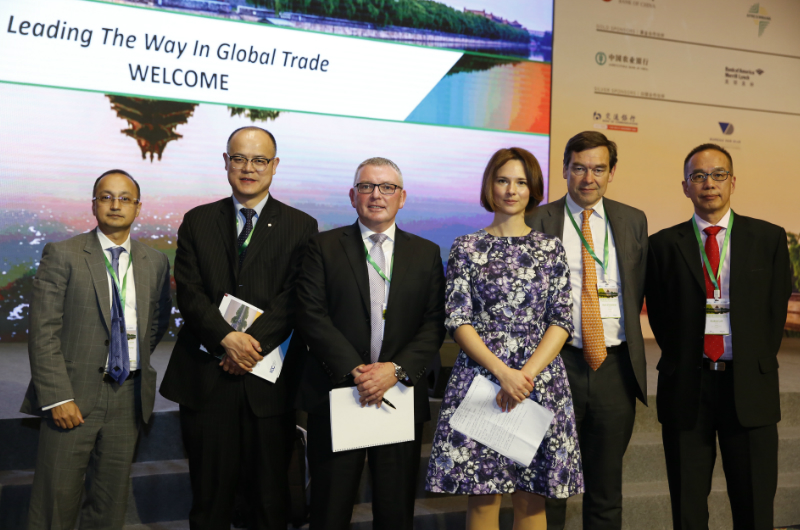
Left to right: Biswajyoti Upadhyay (Standard Chartered Bank); Armstrong Chen (Shanghai Banking Law & Practice Center); Adrian Rigby, Chief Operating Officer, HSBC (Moderator); Polina Evstifeeva (Deutsche Bank); Henri d’Ambrières, (ICC Regulatory Advocacy Group); and Andrew Loh (Atradius)
In a panel that developed points made in previous years about the unintended consequence of the Basel III international regulatory framework for banks – the need for trade finance advocacy to get treatment that reflects its low risk, consistent dialogue with regulators to sustain understanding was a key theme.
Armstrong Chen, Director of the Shanghai Banking Law and Practice Center said that China’s new regulatory regime had become “more conservative” for the financial markets and financial institutions and that today’s regulators are very different from their predecessors. “They enjoy more power, have new responsibilities and pick new measures,” said Chen.
Polina Evstifeeva, Head of Regulatory Strategy, GTB Digital at Deutsche Bank added that after financial crisis 2008, regulators were “focussed on ensuring the financial systems were stable and there was no repeat of the Global Financial Crisis”. She continued, “Now their focus is on they are driving more of a growth agenda. We see a number have seen a lot of regulatory initiatives around the globe promoting innovation and adoption of advanced technologies in banking, e.g. AI, Cloud, APIs and blockchain digital, and are coming up with innovations. And looking to help banks innovate.”
Shifting supply chains
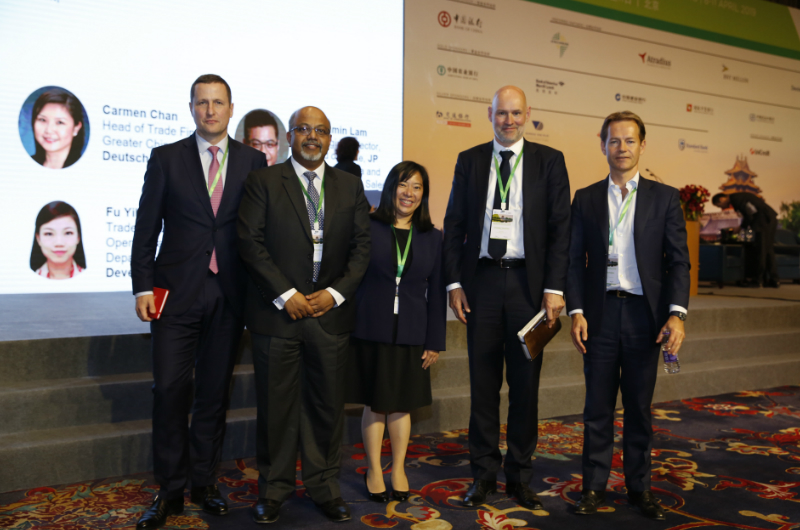
Left to right: Kai Fehr (Wells Fargo); Vinod Madhavan (Standard Bank Group): Jenny Chan (Royal Golden Eagle); Christian Hausherr (Deutsche Bank and Chair of Global Supply Chain Forum): Rogier Schulpen (Santander)
“When I arrived at the hotel here, the noisiest thing on the street was the water fountain here – the traffic was silent”, commented Deutsche Bank’s Christian Hausherr (European Product Head of Supply Chain Finance and Global Supply Chain Finance Forum Chair). Chinese electric vehicle manufacturing had got to a point where although traffic was no longer bicycle-led, there was little engine noise – China is the world’s largest EV producer.
Hausherr’s panel took a closer look at the shifts in supply chain patterns in an economic environment shaped by the ongoing US/China trade wars and the Belt and Road initiative and the overall sense was that while supply chains would always gravitate towards sources of low labour cost (hence the movement from China to Vietnam Thailand and Bangladesh), this was tempered by the shortening of supply chains in the face of political uncertainty – keeping them as close to the source as possible.
Patterns of supply and demand varied according to regional perspective. Jenny Chan, Senior Treasury Manger at Royal Golden Eagle, an US$20bn total assets with 60,000 employee group of resource-based manufacturing companies, told delegates that they can’t keep up with Chinese demand. “Whatever we produce in China is insufficient for domestic market needs and we have to move goods over from Asia and Brazil.” She added that all-round emerging market demand from Asia, Africa and the Middle East, in addition to Chinese demand, is fuelling expansion across a number of business lines.
Wells Fargo’s Head of Trade Asia Pacific Financing Kai Fehr confirmed that the friction between the US and China is clearly affecting supply chains – the bank’s supply chain servicing operations touch 1500 suppliers across China and, recently, a drop in US-China flows has been identified. Soft commodity flows, said Fehr, have moved away from the US and these are the sorts of supply chains that can be changed quite quickly. “Manufacturing flows are harder to switch,” he observed.
Sustainability was another core theme across several sessions, this one was no exception – albeit with mixed views on how distributed ledger technology would really help to facilitate this.. “Sustainability starts with us…and everyone wants the cheapest prices in the supermarket,” and I think we are unfair on producers,” reflected Rogier Schulpen, Global Head of Trade and Working Capital Solutions at Santander. “Consumers can influence what they buy – and their buying behaviour can influence sustainable production. What can we do as banks? As long as our objective are income and ROC sustainability is nice to have. If governments and regulators get behind it and allocate a lower capital for loans to companies who produce in a sustainable way everything will change,” said Schulpen. Work is underway at the ICC discussing this with regulators. “The stick itself is not sufficient and there needs to be more carrot,” he concluded.
The panel then turned to the importance of sustainability in trade and how distributed ledger technology could possibly support it. Jenny Chan said that “in an environment where stakeholders and customers are asking for product sourcing and provenance information, blockchain provides traceability and transparency over production value chain and facilities verification”.
Christian Hausherr commented that if there was some sort of index measuring sustainability that could also help. Standard Bank’s Group Head of Trade Vinod Madhavan agreed this would be helpful but pointed out that the top priority of the industry is access to trade finance in the first place. “Some banks in Angola don’t have access to dollar correspondent banking,” he said.
Belt and Road
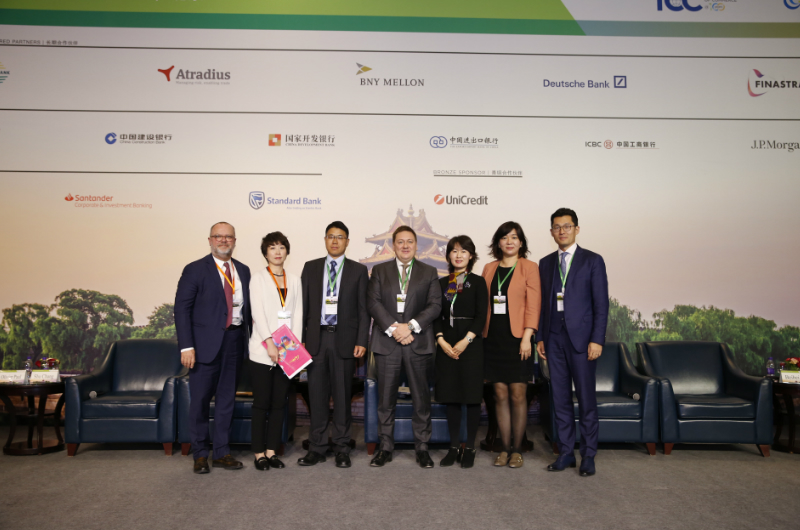
Left to right: Olivier Paul (ICC); Shu Chang (Export Import Bank of China); Gong Chungang (CDB); Justin D’Agostino (Herbert Smith Freehills); Zhao Fujun (ICBC); Beibei Li (Citi); Daniel Qian (Deutsche Bank)
This transcontinental long-term policy and investment programme aimed at infrastructure development and acceleration of the economic integrations of countries along the route of the historic Silk Road has been gaining traction since it was first unveiled by China’s President Xi Jinping in 2013 as what was then One Belt One Road.
The Asian Development Bank had estimated an infrastructure funding gap in Asia at US$26trn through to 2030, and it was the ICC Banking Commission’s Head of Policy, Olivier Paul, that chaired a panel looking more closely at the opportunities for international banks and corporates to build, consult and finance projects. One obvious example is ICBC, and Zhao Fujun, Deputy General Manager of the Global Finance department opened by explaining that the bank has more than 400 institutions in 47 countries and that a presence in all major BRI countries “would mean you can access our services from anywhere in the world.”
Shu Chang, Deputy General Manager, Trade Finance Department, The Export-Import Bank of China set the scene by reminding delegates that although BRI is already in a lot of countries, “it is still expanding”. It is not a physical road or belt, “but more of an idea around creating core connections”. He made the point that “more projects bring more trade, including services and equipment” and that once the infrastructure was built, there would be “a strong boost for trade”.
Deutsche Bank’s Head of Structured Trade and Export Finance China, Daniel Qian, observed that BRI was about putting people together and making projects work – citing Siemens’ “go global” endeavour as one of the first global companies to partners with Chinese EPCs (Engineering, Procurement and Construction) but also between banks such as Deutsche Bank working closely with major Chinese banks supporting common clients in BRI countries.
However, while the initiative is, in the words of ICC BRI Chair, Justin D’Agostino (Global Head of Disputes at law firm Herbert Smith Freehills) “simply massive and unprecedented”, the risks associated with financing BRI projects, he explained, “are significant”. He said that he has already seen some projects cancelled with financing dried up and disruption when new governments are elected. When banks weigh up their risk appetite, they seek “watertight dispute resolution provision in their contracts”.
D’Agostino pointed out that mainland China, Hong Kong and Singapore were all positioning themselves as a hub for BRI disputes rather than accepting a Western approach – here, “the balance of power lies with the Chinese party and mediation approaches are often drafted into the contracts”. The ICC’s Belt and Road Commission was launched in January 2018 to extend its existing dispute resolution services to support BRI disputes.
Going forward
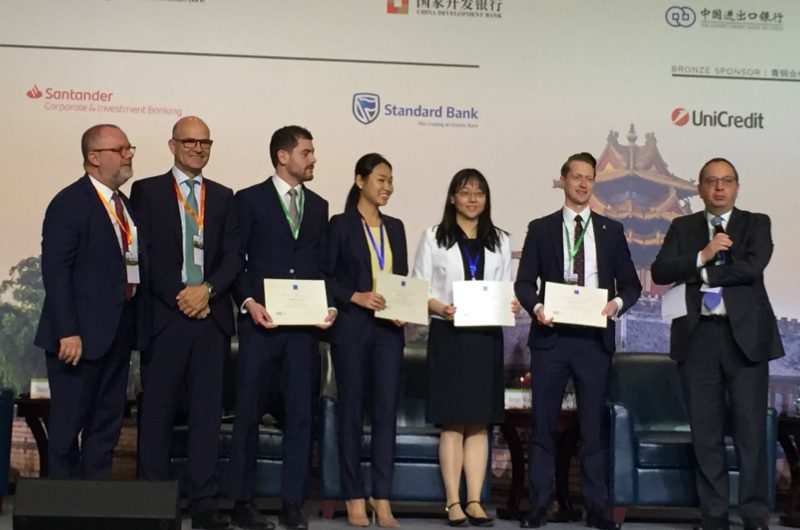
Successors in Trade display their certificates. With ICC Banking Commission’s Olivier Paul (left), Daniel Schmand (second left) and Rüdiger Geis (far right), the group comprises: Roberto Leva (J.P. Morgan) Yuliya Tsoy (Wilben Trade Ltd); Tan Lu (Deutsche Bank) and Jordan Windsor (ANZ Bank)
Mindful of the fact all professions have to attract young people if they are to endure, the ICC Banking Commission launched its “Successors in Trade” Programme in 2018, aimed at identifying and supporting an emerging generation of international trade finance experts.
One of those “successors” is Deutsche Bank’s Tan Lu, who had been tasked with a project to the ICC Banking Commission with other participants from J.P. Morgan and ANZ Bank over the past year. The programme was formally introduced to delegates during one of the plenary sessions on Day 2 of the conference by its chair, Rüdiger Geis, Head of Product Management Trade at Commerzbank including the project programme results presented by Tan.
Tan, who is originally from Hangzhou and has lived in German speaking countries for past 16 years) and her fellow project group members had completed the project programme which culminated in making recommendations about how the ICC Banking Commission could further adopt a digitalised market by “identifying new players in the trade and trade finance space, analysing the challenges and opportunities arising from the new technology and proposed a detailed scheme for further collaboration”.
Reflecting on an action-packed two days, the words of CCPIT Chair Gao Yan say it all: “The ICC Banking Commission Annual Meeting was a flagship gala for global trade and finance, serving as an important platform for the banking communities of all countries so share thoughts, experience and cooperation patterns.”
“We saw this very much in action in Beijing,” and, concluded ICC Banking Commission Chair Daniel Schmand, the foundation principles of peace, prosperity and opportunities for all were very much in evidence. With Asia Pacific as the world’s number one trade finance hub and Beijing’s position as a cornerstone of global economic growth, the ICC’s second century looks set to be facing East.
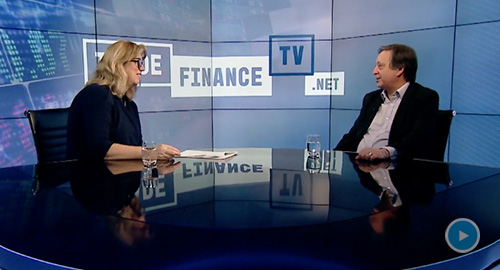 A Framework for Trade Finance Digitalisation
A Framework for Trade Finance Digitalisation
On 10 July 2019, the International Chamber of Commerce (ICC) released electronic supplements to the existing Uniform Rules for Collections (URC 522) and Practice for Documentary Credits (UCP 600) rules.
But despite all these encouraging developments in standards and rules, why is it taking so long for trade participants to agree a common approach? Trade Finance TV talks to David Meynell, Senior Technical Adviser at the ICC Banking Commission and Co-owner of tradefinance.training about the ICC’s roadmap of digital standards.
